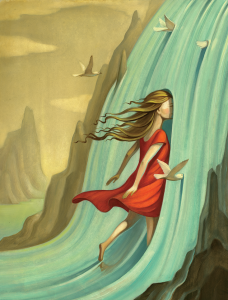Our days on earth are like grass; like wildflowers, we bloom and die.
– The Psalmist –

Last week I had a fascinating conversation with someone about liminal spaces. It is a topic that I am very interested in as I have found that my life has often led me into these perplexing spaces. “Betwixt and Between” is what Victor Turner called them. Threshold moments of letting go of a season in your life while still not having fully landed in the next phase. Liminality is not a comfortable place as it brings with it a sense of pilgrimage and movement. It’s like living out of a caravan. It is the ‘free fall’ between separation and re-assimilation.
The man I was talking to was a professor of history and the question he posed to me that day has given me some serious reflection moments: “Don’t you think that our whole life is a liminal space?” At first, I resisted this idea. Surely we are not on a perpetual pilgrimage? Or are we? Is the idea of reaching the next chapter and settling in, just that? An idea? Or perhaps even a mirage? Human nature would not allow for this permanent liminality – falling between the cracks of an imagined social structure and remaining there like a sewer dweller. We want safety, borders, predictability, and acceptance. This is not what liminal spaces are all about. And maybe that is why we spend our whole life fighting them!
That hit me like a ton of bricks in the middle of the night. Of course! Our ridiculous notions of happiness are nothing else than an escape plan out of liminality. Existential angst manifests itself in so many ways. We may never acknowledge the anxiety that accompanies what it means to simply live. And maybe that is why we have such a terribly hard time coming to grips with the ever-shifting sand under our feet from the time we are born to the time we go to the grave.
But what if we simply accept the fact that liminality is what life is about? What if we created a different narrative around the ‘shifting sand’? What if we recognised in this consistent state of flux we can also find freedom and growth? Understanding liminality as a part of everyday life prepares us for the one thing that is certain: change! Change comes to all of us, whether we like it or not, admit it or not. Just take a look in the mirror and then look at a photo of ten years ago … it’s called change.
I realise we need stability. I am not suggesting we turn into unreliable liminal travellers driven by every whim or fancy. Rather, I am asking how seeing our whole life as a liminal space can help us in navigating the twists and turns that life brings. We are pilgrims on this earth. We are a moment, a breath. The Psalmist said we are like wildflowers … we bloom and we die (Psalm 103:15). If we begin to really see our lives like this, perhaps we can curb our empty pursuit of happiness and simply enjoy the moment, the shifting sand, the twists, and the turns?
I guess what I am really trying to say is that perhaps liminality is given to us as a gift? Instead of fighting it, we can make peace with it. When we truly grasp that our whole life is a liminal space then we can also learn how to live in the moment and the now. Liminality undergirds mindfulness as we take nothing for granted. Liminality assists us in overcoming a sense of entitlement. Liminality is what gives sight to blind privilege.
So, dear friend, next time life grabs you like an unexpected wave in the ocean and tosses you around, breathe deeply. You are a pilgrim. Your whole life is a liminal space. You are that trapeze artist who can let go and not freak out. You can change. You eat “betwixt and between” for breakfast. You are fearfully and wonderfully made. You’ve got this!

The paradox: there can be no pilgrimage without a destination but the destination is also not the real point of the endeavour. Not the destination, but the willingness to wander in pursuit characterises pilgrimage. Willingness: to hear the tales along the way, to make the casual choices of travel, to acquiesce even to boredom. That’s pilgrimage – a mind full of journey.
– Patricia Hampl –